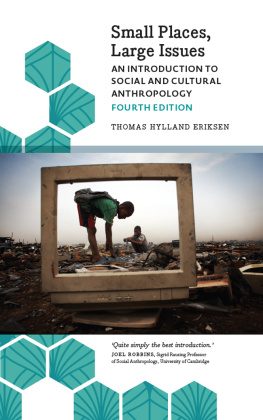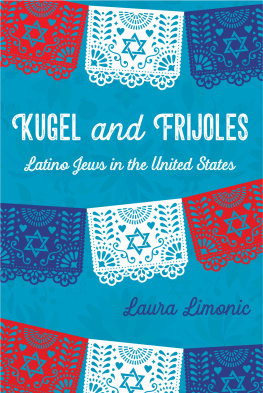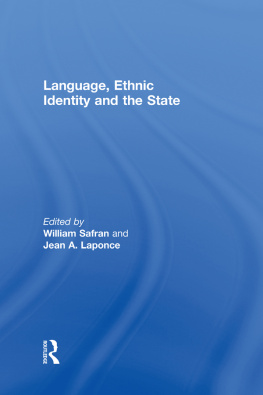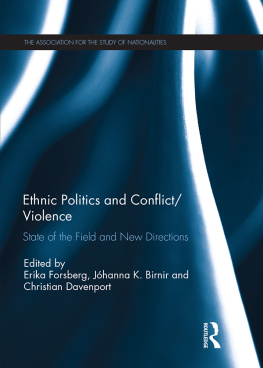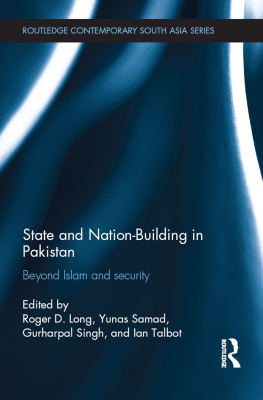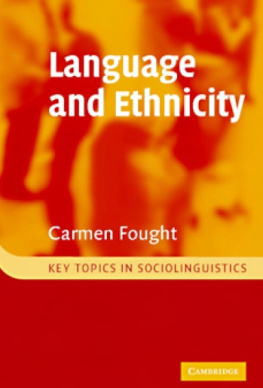Global Issues
General Editors: Bruce Kapferer, Professor of Anthropology, James Cook University and John Gledhill, Professor of Anthropology, Manchester University
This series addresses vital social, political and cultural issues confronting human populations throughout the world. The ultimate aim is to enhance understanding and, it is hoped, thereby dismantle-hegemonic structures which perpetuate prejudice, violence, racism, religious persecution, sexual discrimination and domination, poverty, and many other social ills.
First published in 1998 by Berg Publishers
Published 2020 by Routledge
2 Park Square, Milton Park, Abingdon, Oxon OX14 4RN
605 Third Avenue, New York, NY 10017
Routledge is an imprint of the Taylor & Francis Group, an informa business
Thomas Hylland Eriksen 1998
All rights reserved. No part of this book may be reprinted or reproduced or utilised in any form or by any electronic, mechanical, or other means, now known or hereafter invented, including photocopying and recording, or in any information storage or retrieval system, without permission in writing from the publishers.
Notice:
Product or corporate names may be trademarks or registered trademarks, and are used only for identification and explanation without intent to infringe.
Library of Congress Cataloging-in-Publication Data
A catalogue record for this book is available from the Library of Congress
British Library Cataloguing-in-Publication Data
A catalogue record for this book is available from the British Library.
Typeset by JS Typesetting, Wellingborough, Northants
ISBN 13: 978-1-8597-3954-9 (hbk)
Habit of seeing opposites. The general imprecise way of observing sees everywhere in nature opposites (as, for example, warm and cold) where there are, not opposites, but differences in degree. This bad habit has led us into wanting to comprehend and analyse the inner world, too, the spiritual-moral world, in terms of such opposites. An unspeakable amount of painfulness, arrogance, harshness, estrangement, frigidity has entered into human feelings because we think we see opposites instead of transitions.
Friedrich Nietzsche, Der Wanderer und sein Schatten, 67
It takes at least two somethings to create a difference. ()
There is a profound and unanswerable question about the nature of those at least two things that between them generate a difference which becomes information by making a difference. Clearly each alone is for the mind and perception a non-entity, a non-being. Not different from being, and not different from non-being. An unknowable, a Ding an sich, a sound from one hand clapping.
Gregory Bateson, Mind and Nature, p. 78
Can multiethnic nations be stable and meaningful imagined communities? Are multiethnic societies necessarily multicultural ones, or is the very term multicultural society a contradiction in terms? To what extent do processes of modernisation lead to an obliteration of ethnic boundaries, and in what ways are the very same boundaries strengthened through social change? Is it possible to avoid discrimination against minorities in multiethnic society? How can ethnic conflict be avoided? And what does the word we mean?
These are some of the questions raised in this book questions that have occupied much of my intellectual attention for the last decade, not least with respect to Mauritian society. As this book will make clear, the recent historical experiences of Mauritians can provide a profound and nuanced understanding of multiethnic societies. This can serve as a counterexample to the depressingly numerous cases of violent ethnic conflict of recent years, and can provide fresh and sometimes unexpected premisses for ongoing debates on multiculturalism and minority rights worldwide.
The book is written in a comparative spirit. I have sought to use the example of Mauritius to make sense not only of fundamental processes of identification, ethnic and non-ethnic alike, but also to shed light, albeit indirectly, on tensions and conflicts in other societies. Mauritius, which has often been described as a laboratory of diversity, has a story that deserves to be told, about the possibilities and predicaments characteristic of complex multiethnic societies. In Western Europe, in particular, it is only recently that identity politics has become an issue of national concern; but Mauritius has been self-consciously multiethnic since its inception as a society nearly three hundred years ago, and may for that reason have a lesson to teach the rest of us.
Parts of this book are identical or similar to work published earlier, to the extent of as little as a sentence or as much as a few pages. Much has been adapted from Communicating Cultural Difference and Identity (Eriksen 1988), an early study of ethnicity and nation-building in Mauritius. Much less has been grafted from my doctoral thesis, Ethnicity and Two Nationalisms (Eriksen 1991c), which was a comparative study of nation-building and interethnic relations in Trinidad and Mauritius, very different in scope from the present study. Snippets and excerpts have also been taken from Mauritian Society between the Ethnic and the Non-ethnic (Eriksen 1997a), The Cultural Contexts of Ethnic Differences (Eriksen 1991a), Multiculturalism, Individualism and Human Rights (Eriksen 1997b), Nationalism, Mauritian Style (Eriksen 1994a), Multiple Traditions and the Problem of Cultural Integration (Eriksen 1992b) and We and Us: Two Modes of Group Identification (Eriksen 1995). These articles may often be the fullest sources for the particular issues they raise concerning Mauritian society for although important research undertaken by other scholars is under way, Mauritius is still seriously understudied anthropologically; but conversely, most of this book consists of original material.
During my long-standing engagement with Mauritian affairs, which has sometimes brought me precariously close to meddling, I have made many friends and no enemies. Very many Mauritians deserve a note of thanks, and I can only mention a few of them. I have a great debt of gratitude towards the Cotte/Jugdhur family, Suren Pamoo and Suresh Pamoo, Alix Koenig and Georges Koenig for their extraordinary hospitality; Malenn and Adi Oodiah, Elisabeth and Gatan Boull, Amrita Suntah and Patrick Bazile and his family thanks for their friendship and intellectual input; and I am also grateful to Raj Virahsawmy, U. Bissondoyal, Dev Virahsawmy and, in particular, Vinesh Hookoomsing, for their enduring interest in my work. Many others could have been mentioned, Mauritians and non-Mauritians alike you know who you are.
Oslo, November 1997
CHAPTER ONE
Introduction
Commenting obliquely but accurately on the genre of biography, Virginia Woolf lets the protagonist of her novel Orlando (1928) assume an enormous and seemingly unrealistic variety of social roles and identities, right down to the point of changing gender. Yet, the narrator says towards the end of the book, she has written only a small fraction of the possible biographies that could be written about Orlando; in other words, persons have many more dimensions than a single book might reveal.
The people of Mauritius, it is tempting to say, collectively exploit a fair proportion of Orlandos vast role repertoire. Mauritius, a polyethnic island-state in the south-western Indian Ocean, has for historical reasons an ethnically very diverse population of about one million, four major religions, a large but uncertain number of languages, and no indigenous population. Widely considered an economic miracle by the 1990s, Mauritius is also a stable multi-party democracy that has gone through several peaceful changes of government since independence in 1968. Mauritius has, since its independence, consistently failed to fulfil the predictions of gloomy prophets. The island, regarded by its colonial administrators as hopelessly overpopulated, ethnically divided and overdependent on sugar mono-culture (Meade


